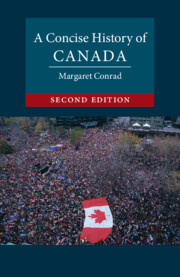Book contents
- A Concise History of Canada
- Cambridge Concise Histories
- A Concise History of Canada
- Copyright page
- Contents
- Illustrations
- Acknowledgements
- Introduction A Cautious Country
- 1 Since Time Immemorial
- 2 Natives and Newcomers, 1000–1661
- 3 New France, 1661–1744
- 4 The Struggle for a Continent, 1744–1763
- 5 A Revolutionary Age, 1763–1815
- 6 The Great Northwest, 1763–1849
- 7 Transatlantic Communities, 1815–1849
- 8 Coming Together, 1849–1885
- 9 Making Progress, 1885–1914
- 10 Hanging On, 1914–1945
- 11 Liberalism Ascendant, 1945–1984
- 12 Anxious Times, 1984–2015
- 13 Where Are We Now?
- Notes
- Guide to Further Reading
- Index
13 - Where Are We Now?
Published online by Cambridge University Press: 12 August 2022
- A Concise History of Canada
- Cambridge Concise Histories
- A Concise History of Canada
- Copyright page
- Contents
- Illustrations
- Acknowledgements
- Introduction A Cautious Country
- 1 Since Time Immemorial
- 2 Natives and Newcomers, 1000–1661
- 3 New France, 1661–1744
- 4 The Struggle for a Continent, 1744–1763
- 5 A Revolutionary Age, 1763–1815
- 6 The Great Northwest, 1763–1849
- 7 Transatlantic Communities, 1815–1849
- 8 Coming Together, 1849–1885
- 9 Making Progress, 1885–1914
- 10 Hanging On, 1914–1945
- 11 Liberalism Ascendant, 1945–1984
- 12 Anxious Times, 1984–2015
- 13 Where Are We Now?
- Notes
- Guide to Further Reading
- Index
Summary
This chapter focuses on the success of the Liberal Party under its new leader Justin Trudeau in rising from its third party status in 2011 to win a majority of seats in the 2015 election. Promising to abandon austerity budgeting and boasting that “Canada is back” on the world stage, Trudeau embarked on progressive policies relating to Indigenous relations, international affairs, gender equality, climate change, admission of Syrian refugees, child care, and infrastructure spending. His progressive thrust was soon compromised by countervailing forces emanating from provinces, corporations, social conservatives, and American president Donald Trump who demanded a renegotiation of the NAFTA agreement, embroiled Canada in a trade war with China; and treated Trudeau and Canada with open contempt. Unable to square national environmental policies with demands from Alberta and Saskatchewan for more pipelines to carry their oil and natural gas to distant markets, Trudeau was brought low by his government’s decision to buy the Kinder Morgan pipeline to expand Alberta’s exports of heavy oil and by energetic efforts to protect SNC-Lavalin, a multinational corporation based in Montreal, from being persecuted for its corrupt practices in Libya and elsewhere. With Trudeau’s claims to transparency and commitment to environmental sustainability called into question, Trudeau lost the support of many progressive voters, who turned to the Green Party and the NDP in the October 2019 federal election.
Keywords
- Type
- Chapter
- Information
- A Concise History of Canada , pp. 471 - 485Publisher: Cambridge University PressPrint publication year: 2022

